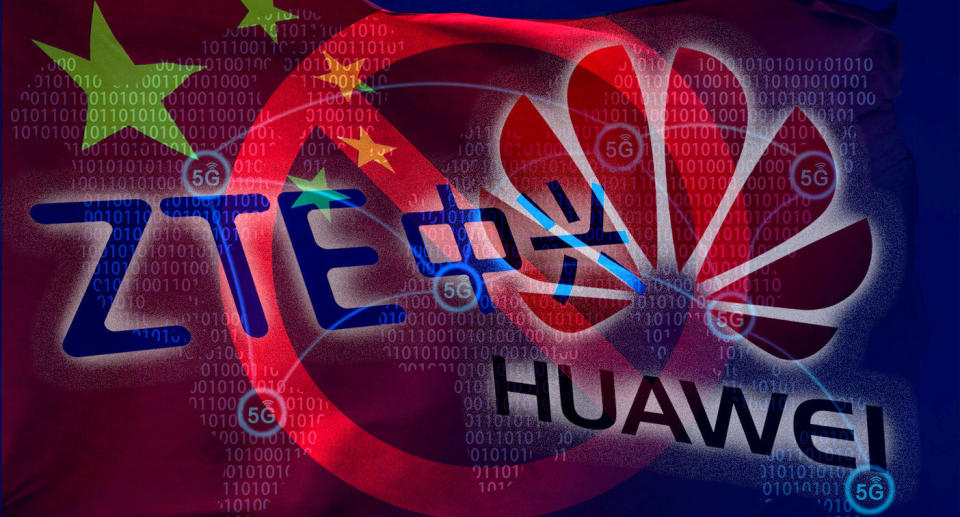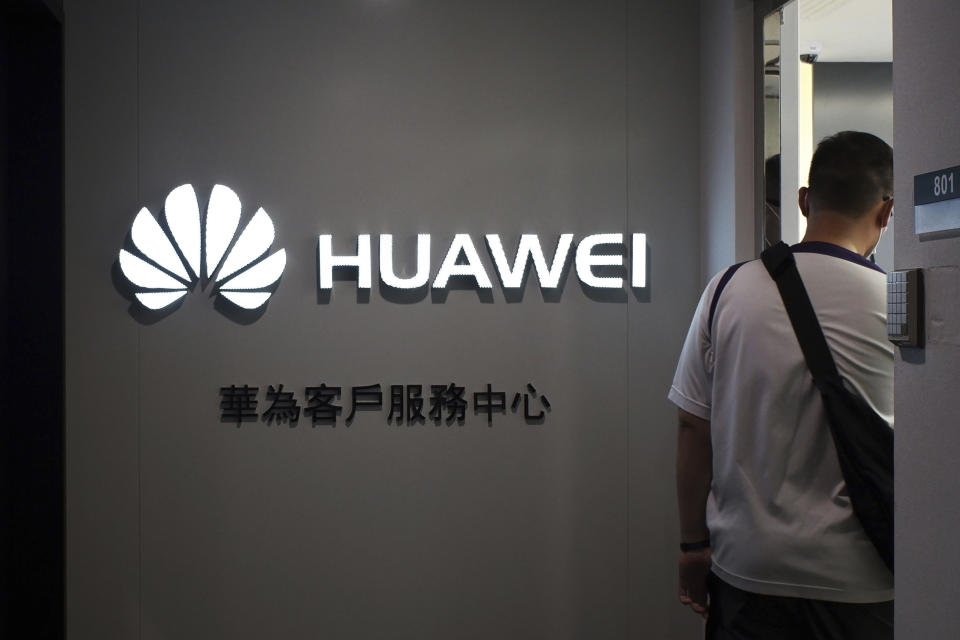U.S. ban on Chinese telecom equipment moves forward amid concerns
WASHINGTON — Amid ongoing international debate about how to confront the national security threats from 5G, a congressionally mandated ban on U.S. government business deals with several Chinese telecom companies, including Huawei and ZTE, is on track to be implemented by late summer, according to the Pentagon.
The Pentagon, the General Services Administration and NASA — members of the government’s Federal Acquisition Regulatory Council — are working to implement the congressional legislation by modifying their procurement regulations, according to the White House Office of Information and Regulatory Affairs. The new rule, which will apply to all executive agencies once complete, “is needed to protect U.S. networks against cyber activities conducted through Chinese Government-supported telecommunications equipment and services,” according to a published description of the change, mandated by the 2019 defense spending bill.
“The review is in coordination and we expect the rule to be implemented by August 2019,” wrote Lt. Col. Mike Andrews, a spokesperson for the Pentagon, in an email to Yahoo News.
However, Huawei is challenging the ban in federal court in Plano, Texas, the location of its U.S. customer service center. It’s unclear whether or not the lawsuit could affect the implementation of the 2019 defense authorization bill.

The Department of Justice declined to comment.
The proposed ban on government procurement of Chinese telecom equipment demonstrates how the Trump administration has struggled to find a way to fight what it argues is the national security threat posed by Chinese companies involved in next-generation communications networks, while also dealing with economic realities that make a complete ban unlikely.
The Trump administration had reportedly considered going further than the defense bill, using an executive order to ban the use of Huawei products for development of 5G, the next generation of high-speed communications networks. However, the administration appears more recently to be backing off from that plan after resistance from U.S. allies and from small and rural companies that fear the costs of cutting out Huawei.

Even as that larger ban languishes, the 2019 defense authorization bill, signed into law last August, would be a first step toward eliminating procurement of Huawei products within the federal government. The bill includes a section that restricts federal agencies, including the Pentagon, from purchasing or utilizing “covered telecommunications equipment” sold by Chinese companies that qualify as “government-supported.”
While top national security and intelligence officials have not provided any hard evidence to prove Huawei has spied for Beijing, supporters of the ban argue that the company is required by Chinese law to comply with any government orders.
The bill covers Chinese companies — namely Huawei and ZTE — that sell communications devices and technology necessary for future 5G networks.
The Federal Acquisition Regulatory Council, which is responsible for implementing the ban, has some latitude in interpreting exactly what Congress meant when passing the 2019 defense authorization, according to Robert Huffman, an attorney with Akin Gump who focuses on government defense contracts and supply chain compliance issues. “The rule will have to interpret” key provisions within the law, including what a “substantial or essential component” is, to determine if a piece of Huawei technology would qualify for restriction, he explained.
“If the terms are construed broadly, it would mean contractors using any Huawei etc. equipment or services anywhere in the world would be barred from federal contracts, period,” he wrote in an email to Yahoo News. “This is the position industry is so concerned about...Most do not believe this will come to pass, as it’s just too disruptive.”
Contractors and federal purchasers will need to pay much closer attention to the security of the supply chain, potentially including products manufactured by Huawei and sold by other companies, according to Huffman.

The prohibition also applies to surveillance and video recording companies in national security contexts, including Hytera Communications Corp., Hangzhou Technology Co. and Dahua Technology Co. For example, if a camera sold by one of those three companies was in use for surveillance of a government facility or for a public safety purpose, that specific use would no longer be allowed. The bill also banned purchase of Hikvision cameras for U.S. government agencies.
In the United Kingdom, British politicians have already raised the alarm about the use of surveillance cameras made by a Chinese firm for surveillance in government facilities, but they have not taken formal legal action to remove the already existing cameras.
This new U.S. prohibition mirrors a similar one included in the 2018 defense spending bill, making it illegal for the government to use or purchasing software from Kaspersky, a Russian cybersecurity and antivirus company. Kaspersky has been unsuccessfully trying to reverse that ban by revealing its source code for outside review and moving its lab from Russia to Switzerland. Two lawsuits brought by Kaspersky Lab alleging that the government’s ban was unconstitutional and brought undue harm were dismissed in May 2018.
The new restrictions on Chinese technology companies, amid an ongoing trade war with China, have encountered more international debate than the similar provision barring Kaspersky. Officials in the United Kingdom appear open to continuing to work with Huawei, and focusing on mitigating the risk of Chinese government access to data. British intelligence agencies have conducted a review of Huawei’s security and concluded there are serious vulnerabilities, but it’s unclear whether those security risks will prompt the government to pursue a ban.
U.S. officials studying Huawei and 5G suggest the company is not going away anytime soon. According to one U.S. government consultant, who asked for anonymity because they were not authorized to speak to the press, Huawei is so deeply involved in developing the international standards for 5G that even its competitors, Nokia and Ericsson, will be beholden to the Chinese company to some extent. “Even if there is an outright U.S. ban… Huawei is still going to have a huge role to play,” the expert told Yahoo News.

In the meantime, Huawei appears determined to fight back; the company sued the U.S. government over the ban in federal court, arguing that the provision is unconstitutional because it targets the company without providing due process. On Monday, Huawei and the U.S. government agreed to a schedule of legal proceedings through September 2019, unless the case is dismissed by the judge beforehand.
Huawei did not respond immediately to a request for comment.
But even as that legal case proceeds, the U.S. government is going forward with its rule change, which would effectively block the company from federal contracts.
Congress appeared to be especially concerned by products sold by the telecommunications companies that can interact with or inspect user data, according to the bill. If the technology is incapable of routing or redirecting user traffic, or surveilling it, there may be an exception for government use.
While the new rule will restrict Huawei’s reach within the United States, it also gives the secretary of defense wide latitude to work with the director of national intelligence and the head of the FBI to expand the restrictions to other companies owned or controlled by a “covered foreign country” — a power that may create uncertainty for U.S. business people and lawyers who work with firms abroad.
Huffman, the attorney at Akin Gump, expects Huawei’s lawsuit to go the way of Kaspersky’s. “That lawsuit will fail on the merits,” he wrote.
However, even if it is not immediately thrown out, Huffman predicted, it would not affect the new rule without a decision on the merits.
“The only thing (other than new legislation) that would prevent or delay the rule from taking effect is if the Trump administration decides to ‘trade it away’ as part of its ongoing trade negotiations with China,” he said.
_____
Read more from Yahoo News:
AOC: Trump is 'absolutely' trying to incite violence against Omar
Trump confirms possible plan to send immigrants to sanctuary cities
Bernie Sanders supports letting jailed felons vote in elections
Buttigieg suggests Pence offered him empty praise when he came out
AOC on ‘Game of Thrones’ finale: It’d be ‘badass’ if it ended in democracy


